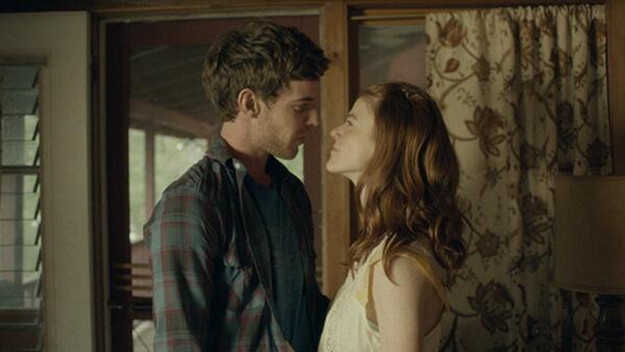This review is going to contain minor spoilers for this film so if you wanted to watch it and feel like this would spoil it for you, then here is your warning to stop reading and go and watch the film. As of the date I'm posting this, the film is currently streaming on Amazon Prime so you should check it out!
This review also briefly mentions miscarriages. If this is something that you are uncomfortable with or unable to cope with, I won't blame you for skipping it. Take care of yourself.
*
My favourite type of horror film is one that is able to confirm my fears, one that says 'hey, you're not crazy for being scared of this because this is a really scary thing'. That's why I like the film I'm reviewing today so much. Honeymoon (2014) pulls forward the fears of being trapped in a relationship with someone you don't really know, on top being a low-key body invasion story.
Honeymoon (2014) follows a newly married couple, Bea and Paul, on their honeymoon in a cabin. Whilst beginning as a cutesy romantic story that may devolve into some mild drama film, it soon takes a tense turn after Bea is found by Paul in the woods one night, completely naked, with no recollection of what happened. Initially suspecting the only other people they have interacted with, a couple who own a restaurant close by, what occurs is horrific blend of tense relationship anxiety and graphic body horror, symbolising the breakdown of their marriage.
 |
| Source: Eclectic Boredom |
What I wrote in my initial Letterboxd review of this film is that it brought me a lot of joy thinking that someone could click on it on [insert streaming site here] thinking it was a romantic drama, and then being horrified at the sci-fi horror elements. The film begins with the two main characters being disgustingly in love and I can definitely see romance fans being drawn in by the saccharine portrayal of their relationship. What I think is great about this is that, on reflection, I can see how much of that level of happiness is just a performance, hiding the horror underneath.
The film takes us out of the fairy-tale that is their wedding (we don't even see that part on-screen) and puts its characters into a cabin in the woods, a motif of horror. By moving the characters from a civilised space to one that is alien to them, it allows them to confront what it is they have been avoiding, forcing them to experience the horrors of each other at their most gruesome. The result of this is a breakdown of societal norms. The assumed typical heterosexual, monogamous relationship is made to feel alien, particularly to Paul. The effect here is twofold, symbolising the idea that you can never truly know another person, as well as an inevitable loss of identity when entering said relationship. As things descend into chaos, we learn that Bea has been writing her name and details about herself in a notebook, as if she has to memorise them in order to exist in the relationship as it is.
 |
| Source: IMDb |
Body horror and the idea of the body being invaded by outside forces isn't a new concept, and it's not even new in terms of it mapping directly onto fears of childbirth or miscarriages. What this film does is use these ideas and isolates them into a familiar scenario, turning a honeymoon nightmareish by forcing the body to be torn into, to have stuff pulled out of it, in what should a romantic and pleasurable holiday, celebrating their new life together. And that's what horror does. It doesn't just take you to a horrific space; it forces the horror out of you, whether you were planning on letting it out or not. It holds a mirror up to this couple and asks them to stop hiding what it is they are repressing.